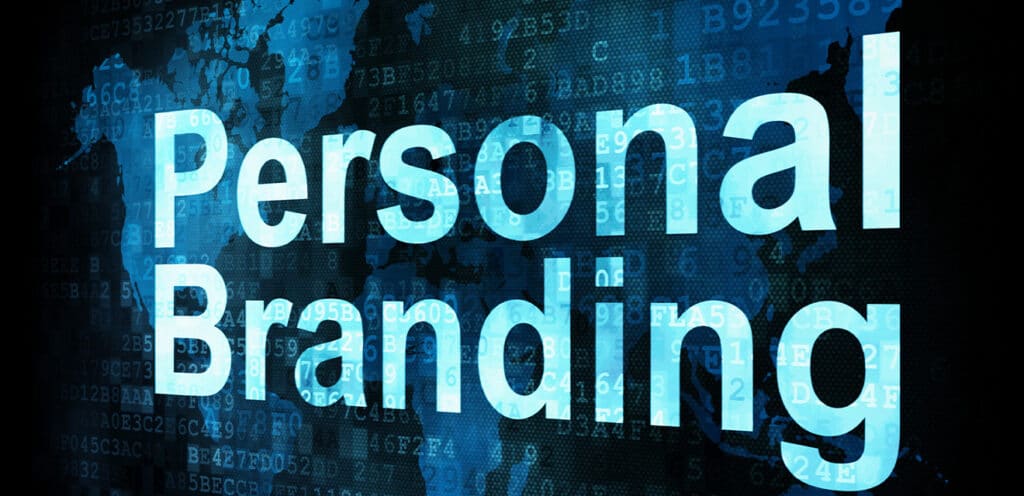When you hear the name Oprah, what comes to mind? Is it her global media empire, her philanthropic work, or simply her trusted voice? Oprah’s name carries weight because she’s mastered the art of personal branding. It’s not just about her company; it’s about the credibility, influence, and trust she’s built as an individual.
A study by Weber Shandwick found that 49% of executives believe a strong CEO personal brand is critical to their company’s overall reputation. In turn, 60% of a company’s market value is derived from its reputation. A strong personal brand means more visibility, more trust, and yes, more revenue. Whether you’re looking to close bigger deals, grow your network, or position yourself as an industry leader, your brand does the heavy lifting.
In this blog, we’ll explore how personal branding can increase your bottom line, the steps to get started, and why it’s crucial for your business growth.

What is Personal Branding?
Personal branding is simply branding yourself. It’s when you, as a person, become the brand. Your name, your image, and everything you stand for start to represent something bigger than just your business, it represents you as an individual. Whether it’s your expertise, leadership style, or unique story, personal branding is about shaping how people see and remember you.
Essentially, it’s your reputation, both online and offline, and how it influences people’s perceptions of you as a leader or entrepreneur.
Now, how does personal branding differ from corporate branding?
While corporate branding is all about shaping the identity of a company or product, personal branding is focused on you. It’s the persona you build around your expertise, character, and influence. Think of corporate branding as the company’s voice and personal branding as your voice, both vital but serving different purposes.
Why does this matter?
Personal branding directly impacts your career and business growth. In a world where people do business with those they trust, a solid personal brand sets you apart from the competition. Whether you’re looking to land new clients, attract investors, or become a thought leader in your industry, your personal brand does the groundwork, opening doors to opportunities that could significantly boost your revenue.
Key Elements of Personal Branding: What You Need?
To build a powerful personal brand, you need to focus on a few key elements that make your brand not only visible but memorable and impactful.
Authenticity
The foundation of any strong personal brand is authenticity. This means staying true to who you are—your core values, strengths, and beliefs. People can spot insincerity a mile away, so being genuine is what builds trust and credibility. The more aligned your personal brand is with your true self, the more it resonates with your audience, and ultimately, the more successful it becomes.
Consistency
Whether it’s how you communicate or the content you share, consistency is what makes your brand stick. You need to ensure your message is uniform across all platforms, whether you’re posting on social media, speaking at events, or networking. Consistency helps build recognition, so your audience knows exactly what to expect from you, no matter where they find you.
Visual Identity
Visuals matter. From how you present yourself personally to the design of your logos or website, your visual identity should reflect your brand’s personality. Think of Steve Jobs, his signature turtlenecks became as much a part of his brand as Apple’s sleek design. Your appearance and the design elements you use should be a direct representation of what you stand for.
Storytelling
At the heart of every great personal brand is a story. Crafting a narrative that connects with your audience on a personal level is key. Share your experiences, your journey, and the challenges you’ve overcome. When people relate to your story, they’re more likely to connect with your brand on a deeper level.
Online Presence
In today’s digital age, a strong online presence is non-negotiable. Your website, social media profiles, and digital content all contribute to how people perceive your brand. Build a footprint that not only showcases your expertise but also engages and interacts with your audience. The stronger your digital presence, the easier it becomes for people to find and trust you.
Steps to Build a Strong Personal Brand

Building a personal brand that stands out takes time, effort, and strategy. Here are the key steps to help you get started and grow your brand effectively:
1. Create Your Own Strategy
Building a personal brand isn’t a one-size-fits-all process, it requires a well-thought-out strategy tailored to your goals, strengths, and audience. Start by defining what you want to achieve with your personal brand. Do you want to increase visibility, build authority in your industry, or attract more business opportunities? Once your goals are clear, map out the steps you need to take.
Consider the platforms you’ll focus on, the type of content you’ll create, and how often you’ll engage with your audience. Your strategy should also include consistent messaging, a strong visual identity, and ways to measure your progress. Remember, a personal brand evolves over time, so adjust your strategy as needed to stay aligned with your goals and audience.
2. Identify Your Target Audience and Goals
The first step is understanding who you’re speaking to and what you want to achieve. Are you trying to attract business clients, land speaking engagements, or position yourself as a thought leader? Defining your audience and setting clear goals will help guide all your branding efforts and ensure you’re speaking to the right people.
Take Marie Forleo, for instance. She targeted aspiring entrepreneurs and creatives who wanted to build successful businesses while maintaining a fulfilling life. Her goal was to position herself as an expert in personal development and business coaching. By offering practical advice through her online show, courses, and books, she built a community of loyal followers who saw her as the go-to source for both business and life coaching.
3. Create Your Own Unique Value Proposition
Your unique value proposition (UVP) is what sets you apart from everyone else. It’s the reason people will choose to follow or work with you over someone else. Ask yourself: What do you bring to the table that no one else does? Is it your expertise, your approach, or your experience? For example, Simon Sinek’s UVP is his ability to inspire people to think differently about leadership and business through his “Start With Why” philosophy. His message is clear, unique, and valuable, and that’s what makes his brand stand out.
4. Showcase Yourself
Building a personal brand means putting yourself out there in a way that highlights your strengths, expertise, and character. This involves being proactive about your visibility. Start by sharing your story: what drives you, the challenges you’ve overcome, and what makes your approach unique. Let people see the real you, because personal branding thrives on authenticity.
Take advantage of every platform available to you. Use social media to post updates, write blogs to share your insights, and create videos that demonstrate your knowledge and personality. The key is to be consistent and intentional about how you show up. Don’t wait for opportunities to come to you, actively position yourself where your audience is most likely to see you. Regularly engage, offer value, and connect with others so that people recognize you as the face behind your brand. Be the Gary Vaynerchuk of LinkedIn, or the Marie Forleo of online business coaching.
Your personal brand is your most powerful tool—don’t leave it to chance. Reach out to Offtech, a leading creative agency in Montreal, and let us help you design a brand that stands out and attracts the right opportunities.
5. Be Consistent and Maintain Your Presence
Consistency is crucial when it comes to personal branding. It’s not enough to make a strong first impression; you need to reinforce it continually. Whether it’s your messaging, tone, or the visuals you use, everything should align with your brand every time you communicate. This includes social media posts, emails, blogs, and even in-person interactions. Consistency is what keeps you memorable.
Create a schedule that allows you to stay visible, whether it’s weekly posts, monthly newsletters, or regular speaking engagements. Make sure your content and interactions reflect your core values and the image you want to portray. Over time, this consistency builds trust, credibility, and a sense of reliability that keeps your audience engaged and loyal to your brand. Remember, personal branding is not a one-off event; it’s an ongoing process that requires constant attention and nurturing.
Why Personal Branding is Important

Establishing Credibility and Trust
A strong personal brand builds credibility in your industry. When people recognize and trust your expertise, they’re more likely to choose you over others. Your personal brand acts as proof of your reliability and commitment to delivering value. According to a study, 92% of people trust recommendations from individuals, even if they don’t know them, over brands.
Differentiating Yourself from Competitors
Personal branding sets you apart by highlighting what makes you unique. It’s your chance to showcase your strengths, values, and approach, making you memorable and distinct from competitors in your field.
Creating Opportunities for Networking and Growth
A solid personal brand attracts more than just clients, it opens doors for partnerships, networking, and growth opportunities. When people trust your brand, they’re more likely to seek collaborations or business deals that can elevate your career.
Common Personal Branding Mistakes to Avoid:
- Being Too Generic
Trying to appeal to everyone waters down your brand. When you’re too broad, you blend in instead of standing out. Your brand should be tailored to your target audience, highlighting your unique strengths and values. - Ignoring Personal Development
Your personal brand should grow as you do. Failing to evolve your brand as you gain new skills or experiences can leave you feeling stagnant. Continuously refining and updating your brand keeps it relevant and aligned with your progress. - Overloading on Self-Promotion
Constantly talking about your services or achievements without offering real value to your audience can come off as pushy. Balance your self-promotion with valuable insights, advice, or stories that engage your audience and build trust. - Lack of Authenticity
Mimicking someone else’s brand instead of being yourself can make it hard to form genuine connections. Your audience wants to connect with you, so be authentic and true to your personality and strengths. - Inconsistent Visual Identity
Frequently changing your logos, colors, or visual style can confuse your audience. Consistency in your visual identity helps people recognize your brand at a glance, which is key for building long-term recognition. - Neglecting Offline Presence
Personal branding isn’t just about what happens online. If you’re solely focused on digital efforts, you might miss out on real-world connections. Attend events, network, and engage in face-to-face interactions to build a stronger personal brand. - Being Reactive Instead of Proactive
Don’t just manage your brand when issues arise. Proactively shape and refine your brand, engage your audience, and seek feedback before problems occur. Being proactive helps you stay ahead and in control of your brand’s reputation.
In Summary
At the end of the day, your personal brand is your most valuable asset. It’s what makes you stand out in a competitive market and helps you connect with the right audience. The key to success lies in staying true to who you are, showing up consistently, and building real connections. And while the journey to a strong personal brand may have its challenges, it’s also one of the most rewarding investments you can make for your career or business.
If this feels overwhelming or you’re unsure where to start, Offtech is here to help. As one of the top creative agencies in Montreal, we know how to turn your personal brand into a powerful tool that drives results. Let us guide you through the process and build a brand that truly reflects your potential.
Get in touch today!
